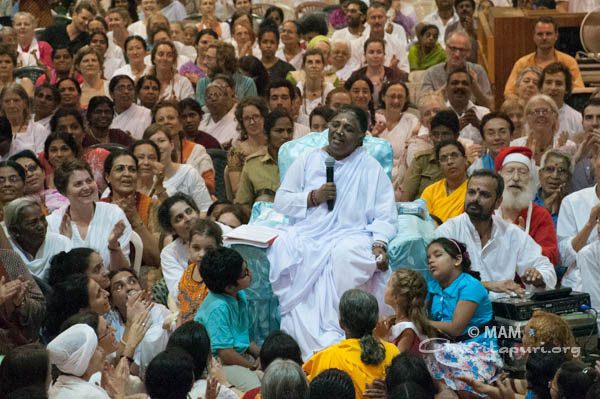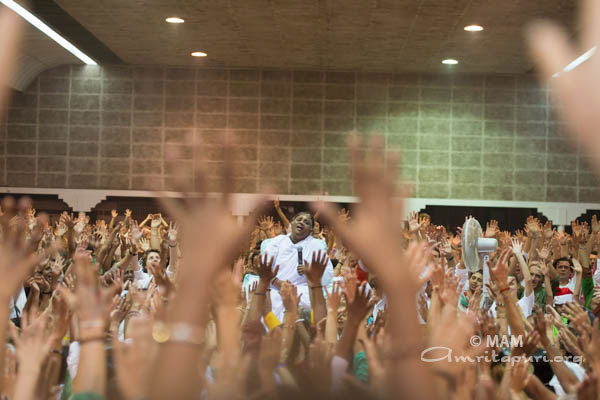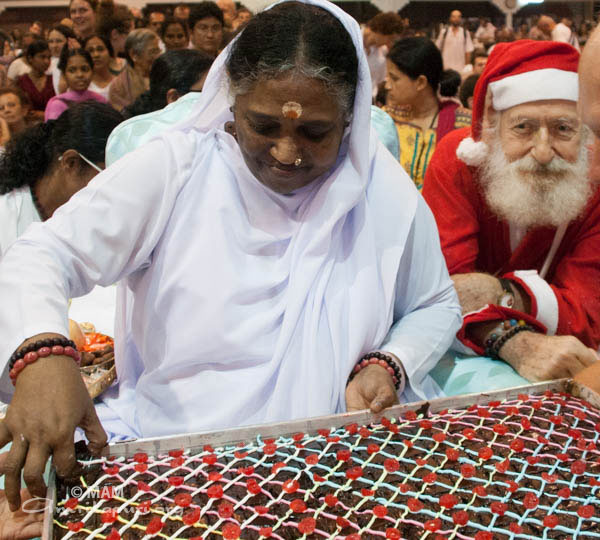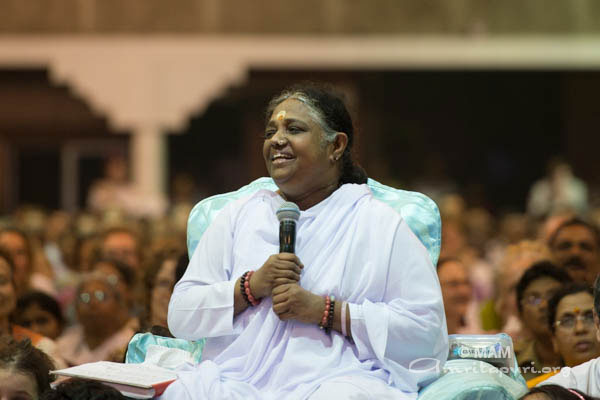From Amma’s Christmas Message
God is said to be the embodiment of infinite divine qualities. He is beyond word and thought. It is through the lives of mahatmas that one directly experiences the divinity of God. The specialty of mahatmas is that they practice what they preach. In this regard, Jesus Christ was no different. He was the embodiment of self-sacrifice, love, knowledge and spiritual experience. Christ’s life itself was his message.

When we look at the lives of great like Sri Krishna and Jesus, we see that there were many evil powers that tried to harm them. There is a spiritual lesson in this: When spiritual knowledge—which can be equated to the divine child—is about to take birth, one’s selfish and materialistic tendencies will try to stop it. Only if one puts forth sincere effort with alertness and care will they attain Self-knowledge. If oil is poured over a spark, the spark will be extinguished. However, once the spark becomes a huge fire, no matter how much oil you pour on it, it will not be extinguished; the oil will be consumed by the fire. Similarly, when spiritual awareness is just beginning to expand within us, all of our negative tendencies and thoughts will try to block it. However, when one is established in Self-knowledge, there will be no place for materialistic tendencies and negativities. All great gurus take birth with the goal of removing the darkness of ignorance and adharma [unrighteousness] from the minds of humankind and spreading the light of knowledge.

Freedom & Bondage
Jesus’ birth reveals another profound spiritual principle. Jesus wasn’t born in a grand palace. He was born in a humble place—in a corner of a stable. His parents were not wealthy or learned. They had nothing to call their own, except their own mental purity. Moreover, other than a few blessed individuals, very few people knew about his birth. The teaching we should take from this is that spiritual awakening comes to those seekers who are humble and patient. Empty yourself of ego and I shall come and rest within—this is the essence of the Lord’s message.
If we take Sri Krishna’s life, we see that he was born in the jail where the wicked Kamsa had imprisoned his parents, Vasudeva and Devaki. The jail represents spiritual ignorance, and Krishna’s birth represents the birth of Self-knowledge, which breaks open the prison doors and frees us. While in jail, Devaki and Vasudeva prayed intensely to the Paramatman. This led to the birth of Lord Krishna. Love has no boundaries and can never be imprisoned behind walls. Even though ostensibly we are all free, we are still trapped in the jails of our ignorant minds. On the other hand, even if a mahatma is put in real jail, internally he is ever free. The external world can never bind a mahatma. Even though mahatmas may live in the world, they are detached from it, like butter floating on water.
The Science of Prayer
When true surrender dawns within, we will awaken and arise. Our state today is that we have knowledge but lack awareness. We may see things, yet we don’t really see them. We may hear things, but we don’t really listen. The reason for this is that our mind is never present in what we see and hear. There is a bhajan that goes, “O Lord, I have come with folded hands before you. Please, listen to me.” The real meaning here is that it is we who—through the heightened awareness of prayer—need to see and listen. Currently our mind is never in the present; it is always wandering this way and that. Although God is within us, we are not in God. Many things in the world bind our mind. To bring the mind back to God, prayer can be extremely useful.
If you were to fall into a deep pit and there were no one around to pull you out, imagine the intensity with which you would call out for help. Such intensity should be there in our prayers. We should call out to the Divine from the bottom of our heart, with a child like innocence. Prayer, chanting one’s mantra and meditation are different ways to awaken the Divine within us.
If we extend our arm outwards and hold a thick book, we may be able to manage to hold it there for five minutes or so. If we force ourselves to hold it like that for an hour, our hand will ache terribly. If we are forced to hold it the whole day, then someone will have to call an ambulance. It is the same way with our sorrow. We need to unburden ourselves of our sorrows, leaving them at the feet of the Divine through heartfelt prayer.
In olden days there would be slabs of stone along the roadside that would be supported by pillars. People carrying huge sacks on their heads or shoulders could place their loads on these slabs and rest for a while. Many of us are shouldering such heavy loads within—more than we can really manage. When we enter the puja room to pray, it is an opportunity to unburden ourselves of this weight.
Let your hearts melt in prayer. Praying with intensity is not a sign of weakness. On the contrary, just as the wax fuels the flame as it melts, intense prayer awakens our devotion and love.
Crying for God is one of the ways to grow closer to the Divine. There are numerous ways to reach the top of a mountain. One person may climb the steps. Another may be pulled up in a basket. Some may scale the rocks… We cannot say that one way is better than another. This is why there are so many spiritual practices enumerated in Sanatana Dharma. If a restaurant has just one dish, not everyone will enjoy it. If a shoe store were to sell only one size of shoe, very few people will be able to buy shoes there. Similarly, no one can say one path is better than another.
Even when we do Self-inquiry, negating the body, emotions and intellect and reminding ourselves that we are the Atma, we are still using the mind to do so. The state that the mahavakyas such as tat tvam asi—”You are That”—reveal are also experienced in prayer when the ego dissolves through the persistent awareness, “I am nothing; You are everything.”
When Devaki and Vasudeva or Mary and Joseph prayed intensely with surrender, understanding that they had nowhere but to the Lord to go for help, then the divine child was born to them. That divinity is there within each one of us, but we are currently unable to see it because our hearts are closed. It is like we are sitting in a boarded-up room and complaining that we are unable to experience the sunlight. If one shines a light in the eyes of a blind man, will he see anything? If someone holds a fragrant flower or sprays perfume under the nose of someone with nasal congestion, will he experience the fragrance? Our heart has to open. When a flower is still in the bud stage, one cannot enjoy its beauty and fragrance. Only when it blossoms can that be experienced.
Rebirth & death of ego
By birth, human beings are children of the universe, but they can be reborn as the children of God as well. This rebirth happens when we completely die to our ego. When the last trace of ego vanishes, that is when the real birth of our identity as the Supreme Self takes place within us. This is not something that is to be experienced after we die. We have to die to the ego, before we really die.
It’s not easy to transcend the ego. When Self-knowledge dawns within, the ego automatically disappears. Ego is like darkness. Darkness is not a something that can be removed. However, when you shine light, it automatically disappears. To bring in the light of Self-knowledge, one needs to engage themselves constantly in sravanam, mananam and nididhyasanam—learning the spiritual teachings, clearing one’s doubts regarding them and then dwelling in those truths.
Our ego has become strong because of our identification to our status and position, and it’s not easy to overcome this attachment. When someone praises us, we easily fall prey to the ego. On the other hand, even if we hear that our true nature is the Supreme Self 10,000 times, it still fails to truly sink in.

The spirit of Christmas is sharing and caring
As Christmas approaches, decorations light up most of the towns and cities, and shops are filled with customers buying Christmas presents for themselves and their near and dear ones. But amidst all this, the focus should not shift from the eternal to the ephemeral. As we enjoy the creation, let us also remember the Creator. If a friend sends you some chocolates, you can enjoy them and at the same time remember your friend as well. In a similar way, we need to keep our focus on the Creator.
Let us try to speak words with a selfless attitude. Words have a lot of power. One wrong word can drive someone to suicide and one right word can save someone as well. There are people who come to Amma and say, “Such and such a person said this to me. I’ve decided to end my life. I’ve even decided the date. What is the point in living in such a world? I loved him and helped him so selflessly. But what I got in return was the exact opposite.” When Amma spends time talking to them and consoling them, they change their decision and go back relieved. What is it that Amma is giving but a few heartfelt words?
We need to perform good actions. This will make us befitting to receive God’s grace. When we flow towards others, God flows towards us. Many people say, “I’ve done so many years of spiritual practices and seva, but what have I got in return?” This is not the right attitude. It should be, “At least I was able to do this many spiritual practices. At least I could do this much service to the world.” If we sow a seed, it may or may not sprout. If it doesn’t sprout, we will have to sow it again. But with good actions it’s never like that. The impressions of our good actions never go away. They are like fixed deposits and will always stay with us. They are not like businesses where we have to start all over again if we incur losses.
The spirit of Christmas is sharing and caring. Let us not just be focused on our lives alone. Let us look around a little and see the needs of others as well. Even if you are able to help just one person, then you have made a difference. If my children can do this, that would be the real Christmas celebration.
The birth of the Lord should take place in our hearts. Let us decorate the manger of our hearts with good thoughts, sweet words and compassionate actions. May the Paramatman rest there always. May grace bless everyone. Amma wishes her children a very Merry Christmas.
* Extracted from the message Amma delivered in Amritapuri Ashram, 25 December 2014.






